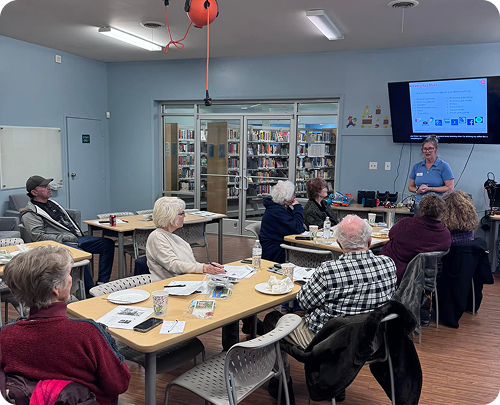CASE STUDY
How Two Rural Libraries Transformed Access With Mission Telecom
Problem
Rural libraries in New Mexico and Texas struggled to provide reliable internet access due to limited infrastructure and unsustainable hotspot programs.
Solution
By partnering with Mission Telecom, both libraries launched flexible, community-tailored hotspot lending programs using affordable, reliable 5G devices.
Result
Thriving programs that increased access and built lasting trust and resilience within their communities.
In the heart of New Mexico and along the Texas-Oklahoma border, two small rural libraries are rewriting the digital equity story. With limited broadband infrastructure and growing community needs, the Belen Public Library in New Mexico and the Pottsboro Area Library in Texas found a transformative partner in Mission Telecom.
Through their partnership, the libraries are now able to provide flexible hotspot lending programs, reinforcing both libraries as vital digital lifelines that offer internet access, literacy services, and emergency connectivity where none existed before.
Quick Facts
Always in Demand
Affordable 5G keeps devices in constant circulation reflecting high community need.
Connectivity Leads to Opportunity
From ESL and adult education to job applications, telehealth, and emergencies, reliable internet is a lifeline to full participation in society.
Flexible, No-Fuss Plans
Programs were tailored to rural libraries’ budgets with dedicated support, easy setup, and no red tape.
Built for Digital Inclusion
Hotspots power more than connection, they’re part of a broader strategy to bridge gaps and uplift communities.
Building Trust and Access, One Hotspot at a Time
For Kathleen Pickering, director of the Belen Public Library and Harvey House Museum Branch, the pandemic made one thing crystal clear: broadband is no longer a luxury. Located 35 miles south of Albuquerque, Belen is a town of 7,300 people, but the library serves all of Valencia County—more than 45,000 residents—many of whom live in areas with no access to fiber or stable internet.
“We started our hotspot program during COVID,” says Pickering. “We received a grant through the Federal Communications Commission’s Emergency Connectivity Fund and piloted a small lending project. Demand was constant, but the funding didn’t last.”
Around that time, she went to a New Mexico State Library meeting and met people from the Albuquerque School District who were working with Mission Telecom.
That introduction changed everything.
Mission Telecom provided the library with 10 5G-capable hotspots and offered E-Rate pricing even before federal approval. The devices are now in constant use, with a waiting list that speaks volumes about community need.
Connectivity Can Be a Lifeline
The impact extends far beyond individual households. Through a partnership with the Valencia County Literacy Council—an organization founded by a library director in the 1980s—Belen expanded the hotspot program to adult learners. The council, which supports roughly 100 students countywide, uses four additional hotspots for basic adult education, ESL, digital and financial literacy, and citizenship preparation.
“We’re gearing up to add health literacy,” says Pickering. “Without reliable internet, it’s hard to file taxes, apply for jobs, talk to your doctor, or help your children with schoolwork.”
Pickering recently discovered a new audience of home-based entrepreneurs and microenterprises, including food truck owners, artists, and other creators. “It’s another community that uses our broadband, devices, and hotspots to get work done,” she says.
From day one, Belen tracked hotspot usage through surveys, offering valuable data back to Mission Telecom. “It is such a partnership,” she says. “They were committed to supporting libraries, and we helped guide that. The switch from Verizon to Mission Telecom improved service and saved us money.” Today, the library is more than a place to borrow books. It’s a telehealth hub, a center for adult education, and part of a broader “library of things” movement. From yard carts to car repair kits, Belen is leaning into the idea that libraries can circulate much more than media. Community trust, built through programs like hotspot lending, makes it all possible.
Meeting Digital Needs with Creativity and Grit
Over 700 miles east, in the small Texas town of Pottsboro, another rural library director was facing similar challenges. Renee Nichols took over the Pottsboro Area Library a little over a year ago. Her community, nestled near Lake Texoma and home to 2,400 residents, experiences frequent internet outages due to weather, infrastructure issues, and power loss. “When the internet goes down, half the town is stuck,” says Nichols. The library had started a grant-funded hotspot lending program, but devices weren’t always returned on time—or at all. The program quietly died when funding ran out.
Determined to try again, Nichols tapped into a Google-funded National Digital Inclusion Alliance (NDIA) grant that allowed the library to serve as a digital navigator hub and provide free tech assistance to individuals in the community and county. They also hosted technology classes and made devices available for use in the library and for loan.
Hotspots Are Just the Start
Mission Telecom sent the library two hotspots to test. “We took them camping, loaned them to Board members, and everyone said that they worked great,” says Nichols. She used some of the NDIA grant funds and Mission Telecom worked with her to build a program that fit the library’s budget. “Matt at Mission Telecom was so helpful. He provided me with different scenarios and potential offerings so we’d know what to buy,” says Nichols.
Today, Pottsboro lends 10 hotspots through its popular Library of Things, which also includes tools, electronics, and household gadgets. Devices are loaned for seven days, with the option to renew if demand allows. “The intention is not for people to get free internet forever,” says Nichols. “The hotspots are for people who have a temporary internet outage and need to apply for a job, do schoolwork, or handle an emergency.”
That need became especially clear when the town’s main internet provider’s line was severed, cutting service to half of the community—including the library! The library distributed hotspots, keeping families, local businesses, and students connected. “It was a game-changer. And now we’re prepared for snowstorms, windstorms, power outages, anything,” says Nichols. Pottsboro has no community center or medical facility, but the library now fills that void. It created a telehealth room, and in the coming months will open a small AI lab for local workforce training. “The hotspot program aligns with everything we’re doing. We’re half books, half technology—and always looking ahead.”
A New Kind of Infrastructure
Both directors emphasize the seamless support they received from Mission Telecom, with flexible pricing, responsive troubleshooting, and help choosing the perfect 4G/5G devices. But what stood out most was the shift in mindset that followed.
“Internet used to be seen as a luxury, but it’s not,” says Pickering. “Most government services, jobs, and schools rely on it, and hotspots have magnified internet accessibility for us tenfold.”
Nichols agrees, saying, “We’re not just giving out devices; we’re giving people access to their future.”

